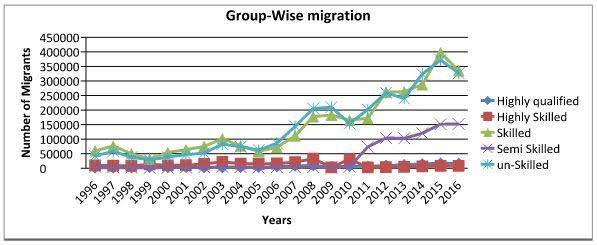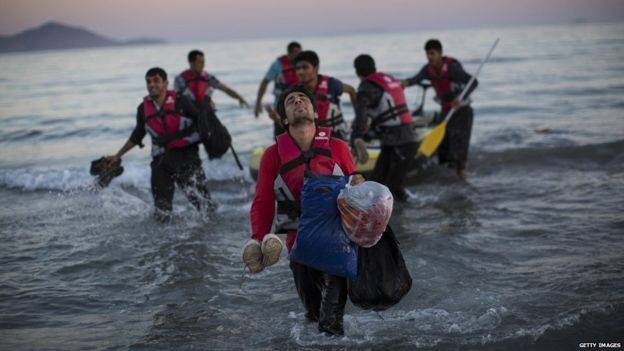Labor mobility refers to the ease with which the laborers can move within and between different economies. This article primarily deals with labor mobility based on geographical reasons. The geographical labor mobility refers to workers’ ability to work in a specific physical location.
Economic deprivation in Pakistan has been the single biggest factor contributing in migration of workers. Despite being branded lately, by some reputed magazines and newspapers, as a strong emerging economy in the next five years, the outflow of economic migrants has apparently continued at the same increasing rate. Pakistan’s economy has been in dire straits, and unfair distribution of resources leading to inequality is pushing more and more people below the poverty line. Pakistan’s population rate of 2% has been an impediment to growth of the country, pushing it to the edge as it is expected that population will hit 220 and 380 million by 2020 and 2050, respectively.
The following chart depicts the official statistics for the number of Pakistanis going abroad for employment, registered by the bureau of emigration and overseas employment.

The main destinations of Pakistan immigrants have been KSA, UAE, Bahrain, UK, EU and Northern America. Since, the 1970s more than 8 million Pakistani workers have migrated through the proper channel. The impact of terrorism, security issues, and bleak economic environment has prompted the individuals to seek economic mobility elsewhere. In the last six years, more than 3 million people have left the country for foreign based jobs.

This graph depicts that overall a more acute surge in migration has been witnessed in 2011 to 2016. The trend had started for skilled and semi-skilled workers in 2006, but the disastrous position of the economy has pushed the people into migration in the last six or so years.
Most of the workers leaving Pakistan for better opportunities abroad can be termed as economic migrants. It is not a legal classification, rather an umbrella term used for an array of people that move from one country to another to improve their professional economic prospects.
Over the years, Pakistan has witnessed a huge increase in population and labor force. The government’s failure to create job opportunities has resulted in mass employment and poverty.
With surge in working-age population in Pakistan, an increasing number of workers are moving abroad. Based on the official figures, Pakistan annually sends the second largest grouping of workers abroad, mainly to Gulf nations. Pakistani migrants normally do not qualify for the asylum and are put in the categories of economic migrants. The number of workers migrated abroad shown in the official records highlight the stark difference from reality, as actual unofficial figures are fairly high. The amount of remittances received by Pakistan, as per the State Bank of Pakistan (SBP) record, are apparently too high for the number of immigrants registered to have gone abroad by the Bureau of Emigration and Overseas Employment..
The failure of the government in providing adequate employment opportunities and living standards forces the labour workers to migrate. If they could earn enough to feed their families, they would never put their lives in such a risk. Stories of such larger than life characters, who risked their all to reach the prosperous lands, have been in abundance.
People get motivation and inspiration from sudden and prompt change in the lives of economic migrants living primarily in European countries. With no game-changing possibilities available at home, desperate to change their lives, frustrated individuals, sometimes naturally jealous of their friends and family, opt to take huge risks.
The failure of the political and un-elected dictatorial regimes in Pakistan had a profound impact on how the workers deal with the immensely challenging circumstances and unsustainable developments. As per government data, unemployment has been hovering around 6% mark and will continue to exhibit the same trend in the next couple of years. However, some independent economic think-tanks believe that unemployment rate in Pakistan is nearly 10%. The irony of the matter is that those workers who are dealt with so inhumanely, when in the country, and during the migration process, are not even acknowledged for their distinguished contribution in the form of remittances.
Those who leave the motherland for a better future and fortunes face acrimonious tests during the migration processes, as they get extensively abused by their agents. Illegal migrants face even more horrendous situations.
The anticipation is built on false notion of prompt surge in living standards and better life. Once they hit reality on their way to Europe, they start to value life at home. These shocking stages of their journey may jolt them momentarily, and make them curse themselves for the making ill-fated decision. But the hope of a better future, and chronic unemployment faced at home, push them to continue their voyage at every cost. It really doesn’t matter, if they have to travel through the treacherous Iranian border or have to face the merciless guards at coastal areas of Turkey and Greece, they continue with the slogan of ‘do or die’. If among the lucky, once in Europe it may no longer prove to be a fairy tale as first expected. Migrants expect more humanity shown by the recipient developed EU countries, but the recent hike in Syrian migrants through porous borders has even made them more skeptical of the opportunistic Pakistanis who will cross the Mediterranean as economic migrants rather than asylum seekers. Pakistanis are not welcome now, as EU countries have started to segregate the migrants, based on the reason which convinces them to flee their respective lands.
Beautiful dreams die in the streets of Portugal, at the beaches of Spain and migrant camps of Greece and Germany. Along with them, corrupt and clueless governments are equally responsible for the disastrous and painful circumstances faced by the economic migrants at the streets, borders and in camps of the EU countries. The stranded and struggling economic migrants are the direct product of the unfair and unjust economic system, extreme poverty, and inadequate resources at the disposal of local governments to create job opportunities at grass root level.
This creates tension, stress, and many other abnormal behavioral patterns leading to crimes and many other social disorders. Those who can afford, or borrow, leave the country in hope of better life until hit by reality on the way and in Europe. No doubt, there were times when EU countries were less harsh on Pakistani immigrants but since the huge influx of Syrian migrants, and its resultant backlash from rise of populist sentiment, and terrorist attacks in Belgium and France, life has become difficult for the regimes, with border security forces to control and tame the migrants. Lots of Pakistanis are stranded at the Greek, Turkish, Italian and German camps with their fate undecided; especially the ones in Turkey and Greece are susceptible to return to Pakistan.
Government must adopt solid policies to ensure socio-economic justice. For sustainable development, unemployment must be reduced and GDP must rise to 6 to 7%. Pakistan must develop a national migration policy after comprehensive stakeholders’ consultations. Workers exploitations at the hands of agents should be curbed and more equitable distribution of resources should be made sure to alleviate people above poverty line. Most importantly, improvement in law and order situation, population control, betterment in current account deficit, fiscal deficit, and trade deficit position should be vital targets going forward.






